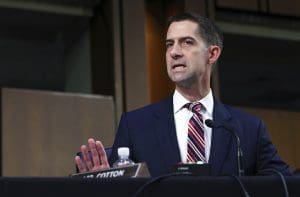GOP fights crackdown on rich tax cheats with debunked claims about IRS bias
Republicans in Congress are upset that the Internal Revenue Service might have more tools to target wealthy tax evaders.

Republican lawmakers are invoking a debunked, eight-years-old fake scandal as an argument against a key component of President Joe Biden’s Build Back Better social spending plan, upset about a provision in the proposed $3.5 trillion jobs bill that would allow the Internal Revenue Service access to a small amount of additional bank data. That, combined with proposed staff increases for the agency, could bring in more than $100 billion in owed-but-not-paid taxes, according to numerous analyses.
According to Biden’s proposal, the funds would be used to help pay for investments in clean energy, climate change infrastructure, child care, health care, paid leave, and free community college and preschool.
“Remember when Obama weaponized the IRS against conservatives?” tweeted Sen. Tom Cotton of Arkansas on Thursday. “Joe Biden wants to weaponize the IRS against every American with a bank account of just $600.”
“OUTRAGEOUS!” complained Texas Rep. Ronny Jackson. “Pelosi is doubling down on a proposal that would allow the IRS to SPY on your bank accounts. This would be a serious invasion of privacy, and it’s especially problematic given the IRS’ history of targeting conservatives. We MUST fight back on this!”
“With the IRS’ history of targeting conservatives, this is alarming,” warned Iowa Rep. Randy Feenstra. “We know Democrats are desperate to find ways to pay for their multitrillion-dollar spending sprees, but spying on every Americans’ bank account is beyond the pale.”
Republican lawmakers oppose this crackdown as a “massive invasion of privacy” and a “bank account surveillance scheme.” But there is no evidence that the IRS was weaponized against conservatives during President Barack Obama’s administration.
In 2013, Republicans attacked the tax enforcement agency for circulating memos urging the agents considering tax-exempt status to pay extra attention to groups with “Tea Party” in their names. The IRS blamed career employees and apologized when this became public, even though none of the tax-exempt applications were rejected on that basis.
But in 2014, a review of IRS documents provided to ThinkProgress revealed that the agency had also flagged progressive groups for additional scrutiny and had done so more extensively than for their Tea Party counterparts.
The agency’s “Be On the Look Out” keyword lists, shared with staff reviewing tax-exemption applications between August 2010 and April 2013, urged heightened scrutiny for organizations with “progressive” or “blue” in their names, for those focused on medical marijuana, and for potential successors to the defunct community organization coalition ACORN.
In 2017, a Treasury Department inspector general’s audit confirmed that conservative groups faced no more unfair scrutiny than liberal ones. “The far right has been beating a drum for years now that there was a partisan attack on them,” Sen. Ron Wyden (D-OR) said at the time, noting that the report showed “that’s just not true.”
Now, eight years later, GOP lawmakers are again bringing up the false claims.
According to a Sept. 29 USA TODAY fact check, the proposed rules would give the IRS information about the “total amount flowing in and out of an account annually” for accounts holding at least $600.
Chuck Marr, senior director of federal tax policy for the Center on Budget and Policy Priorities, told the outlet that such a threshold would make sure wealthy Americans can no longer game the system.
It’s hundreds and hundreds of billions of dollars a year of taxes that are legally owed and not collected at the IRS which has been decimated with a decade of budget cuts, and that has led to a plummeting of audit, particularly of high income people, to the point now where some the highest capital audit rates in the country tend to be in Deep South poor, Black, rural counties, which is obviously upside down. … You want to make sure the threshold is low enough so these people cannot divide up their money into multiple accounts.
Experts say this will let the IRS focus on audits of rich tax cheats, rather than lower- and middle-income families.
“The whole point is it will let the IRS target audits in a smarter way, so honest people are gonna be less likely to be audited,” Center for American Progress senior fellow Seth Hanlon told the American Independent Foundation in April. “People earning under $400,000 — as long as they’re tax compliant — are gonna be less likely to be audited. The audit rate for those earning under $400,000 won’t go up.”
Published with permission of The American Independent Foundation.
Recommended

Florida abortion ban puts GOP Rep. Anna Paulina Luna’s anti-choice views in spotlight
Luna supports abortions bans with no exceptions for rape
By Jesse Valentine - May 07, 2024
Republican Caroleene Dobson wants Alabama abortion ban to go nationwide
Dobson is the Republican candidate in what will be one of the most-watched House races of 2024.
By Jesse Valentine - April 30, 2024
Direct mailers distort California Democrat Will Rollins’ record
Rollins, a former federal prosecutor, is challenging incumbent GOP Rep. Ken Calvert.
By Jesse Valentine - April 25, 2024







































































